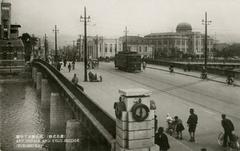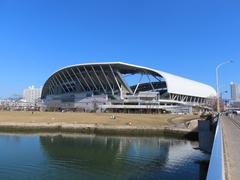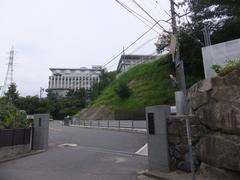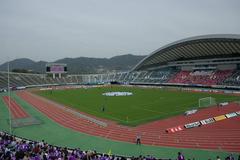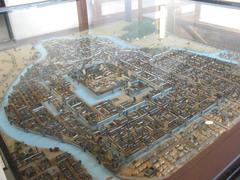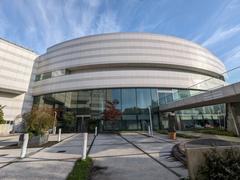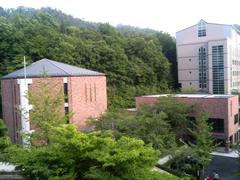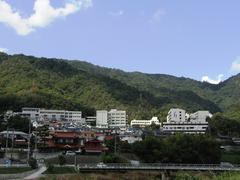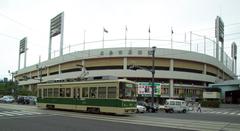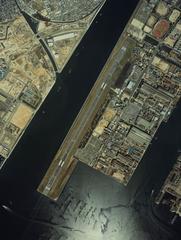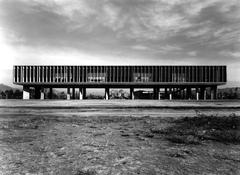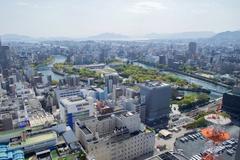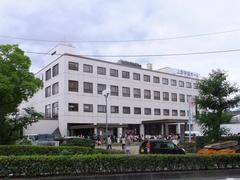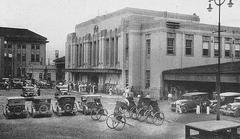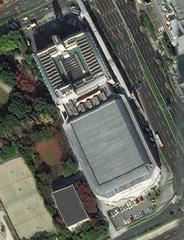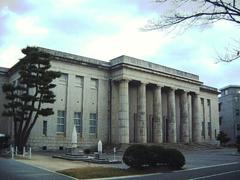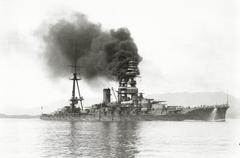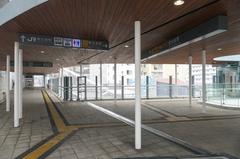Visiting the Consulate General of South Korea in Hiroshima, Japan: Hours, Services, and Visitor Tips
Date: 04/07/2025
Introduction
The Consulate General of South Korea in Hiroshima stands as a critical institution for diplomatic relations, cultural exchange, and community support between South Korea and Japan. Serving the Chūgoku and Shikoku regions, the consulate is a hub for both official consular services and cultural initiatives, underscoring the historic and ongoing ties between the two nations. Its location in Hiroshima—a city renowned worldwide for its legacy of peace and reconciliation—adds deep significance to its mission.
Whether you are a South Korean national needing consular services, a Japanese resident interested in travel to South Korea, or a visitor keen to understand the nuances of Korea-Japan relations, this guide offers practical information on visiting hours, location, accessibility, services, and cultural context. The consulate’s proximity to major Hiroshima attractions like the Peace Memorial Park and Hiroshima Castle makes it an accessible and meaningful destination for visitors.
Guide Contents
- Visiting Hours and Location
- Accessibility and Visitor Tips
- Historical Background and Significance
- Core Services and Functions
- Transportation and Access
- Nearby Attractions and Amenities
- Cultural and Diplomatic Significance
- Special Events and Programs
- Frequently Asked Questions (FAQ)
- Useful Links and Resources
- Summary and Final Tips
Visiting Hours and Location
- Address: 4-22 Higashikojinmachi, Minami Ward, Hiroshima 732-0805, Japan
- Phone: +81 82 568 0502 / 0503
- Email: [email protected]
- Emergency Phone (after hours): +81 90 8712 8028
- Official Website: Consulate General of South Korea in Hiroshima
Office Hours:
Monday to Friday, 9:00 AM – 12:00 PM and 1:30 PM – 6:00 PM
Closed on Saturdays, Sundays, and public holidays (Japanese and South Korean).
Visitors are encouraged to arrive early for appointments, as security checks and visitor protocols are in place. Most consular services require an appointment, which can be booked online or by contacting the consulate.
Accessibility and Visitor Tips
- The consulate is centrally located in Hiroshima and easily reached by public transportation.
- The facility is wheelchair accessible, with ramps and tactile paving in surrounding sidewalks.
- Bring valid identification and all required documents for your appointment.
- Services are primarily offered in Korean and Japanese; English support is available but may be limited.
- Photography inside the consulate is not permitted.
Historical Background and Significance
Origins and Establishment:
The consulate was established following the 1965 Treaty on Basic Relations between Japan and South Korea, symbolizing renewed diplomatic engagement. Hiroshima’s selection reflects both its large Korean community and its status as a symbol of peace.
Korea–Japan Relations:
The relationship between the countries is shaped by a complex history, including colonial rule, migration, and reconciliation efforts. Hiroshima’s Korean community, including many Zainichi Koreans, plays an active role in local society and remembrance events.
Symbol of Peace and Reconciliation:
The consulate actively participates in ceremonies commemorating Japanese and Korean victims of the atomic bombing, promoting historical awareness and peacebuilding initiatives.
Core Services and Functions
Passport and Visa Services
- Passport Issuance/Renewal: For South Korean nationals; requires identification and supporting documents.
- Visa Applications: Available for Japanese and foreign residents in Japan for travel to South Korea. Categories include tourist (C-3), business, student (D-2), employment (E-2), and family reunification (F-6).
Visa-free entry for Japanese citizens is up to 90 days for tourism or short-term business; non-Japanese nationals or those seeking longer stays must apply for appropriate visas. - Korea Electronic Travel Authorization (K-ETA): Required for visa-free travelers, including Japanese citizens. Applications are made online; the consulate offers guidance but does not process K-ETA (K-ETA Official Site).
Civil Registration and Notarial Services
- Family Affairs: Registration of births, marriages, divorces, adoptions, and deaths for South Korean nationals.
- Document Notarization and Legalization: For use in South Korea, including powers of attorney, certificates, and affidavits.
Emergency and Legal Assistance
- Support in cases of accidents, illness, arrest, or loss of belongings.
- Emergency passport issuance with appropriate documentation.
- Liaison with local authorities and communication support for families in Korea.
Support for Business, Trade, and Culture
- Assists businesses with local regulations, visas, and trade events.
- Organizes cultural programs, Korean language classes, exhibitions, and exchange opportunities.
- Promotes Korea-Japan friendship through festivals and educational programs.
Transportation and Access
- By Tram: Fukuromachi Station (Hiroden Main/Ujina Lines), a 3-minute walk from the consulate.
- By Bus: Hiroshima Bus Center is 10 minutes away on foot.
- By Taxi: 10–15 minutes from Hiroshima Station, fare approximately ¥1,200–¥1,500.
- By Bicycle: Bike rental services and parking available nearby.
- Accessibility: Wheelchair access and barrier-free facilities.
Maps and directions can be found via Google Maps or Japan Travel by NAVITIME.
Nearby Attractions and Amenities
- Hiroshima Peace Memorial Park: UNESCO World Heritage Site, with dedicated monuments to Korean victims.
- Hiroshima Castle: Historical reconstruction.
- Shukkeien Garden: Traditional Japanese landscape garden.
- Hiroshima Museum of Art: Japanese and Western artworks.
- Hondori Shopping Arcade: Shopping and dining.
- Accommodations: Nearby hotels such as Hiroshima Washington Hotel and Hotel Granvia Hiroshima.
Cultural and Diplomatic Significance
The consulate’s presence in Hiroshima underscores the city’s role as a global advocate for peace. Through participation in memorial ceremonies and support for cultural and educational programs, the consulate fosters reconciliation and mutual understanding between the Korean and Japanese communities.
Special Events and Programs
- Cultural festivals, Korean language classes, film screenings, and exhibitions are held regularly.
- Commemorative events, especially around August 6 (anniversary of the atomic bombing), highlight shared histories and peace initiatives.
- For current events, consult the consulate’s official website or local event listings.
Frequently Asked Questions (FAQ)
Q1: Do I need a ticket or appointment to visit the consulate?
A1: There is no entry fee. Appointments are required for most consular services.
Q2: What documents are needed for a visa application?
A2: Requirements depend on the visa type. Check the consulate website for details.
Q3: Can I walk in for passport renewal?
A3: Passport services generally require an appointment, but emergency assistance may be available.
Q4: Does the consulate offer cultural programs?
A4: Yes, including language classes and cultural events.
Q5: Is the consulate accessible for visitors with disabilities?
A5: Yes, the building and surrounding area are wheelchair accessible.
Q6: What languages are spoken at the consulate?
A6: Korean, Japanese, and English (support may be limited).
Useful Links and Resources
- Consulate General of South Korea in Hiroshima (English)
- Consulate General of South Korea in Hiroshima (Japanese)
- Hiroshima City Official Tourism Website
- Japan Guide’s Hiroshima Page
- K-ETA Official Site
- Embassy Finder - South Korea in Hiroshima
Summary and Final Tips
The Consulate General of South Korea in Hiroshima provides essential services for South Korean nationals, Japanese residents, and visitors interested in Korea-Japan relations. Its central location in Hiroshima, accessible facilities, and broad service offerings make it a key resource for consular support, business, and cultural exchange. To ensure a smooth visit:
- Verify current hours and appointment requirements on the official website.
- Bring all necessary documents and identification.
- Consider combining your visit with nearby historical and cultural sites.
- Download the Audiala app for personalized travel tips and real-time updates.
For the latest announcements, follow the consulate’s social media and refer to official resources.
Sources
- Visiting the Consulate General of South Korea in Hiroshima: Hours, History, and Travel Tips, 2025, (Consulate General of South Korea in Hiroshima)
- Consulate General of South Korea in Hiroshima: Visiting Hours, Visa Services, and Contact Information, 2025, (Consulate General of South Korea in Hiroshima)
- Visiting the Consulate General of South Korea in Hiroshima: Location, Accessibility, and Cultural Significance, 2025, (Hiroshima City Official Tourism Website)
- Consular Services Offered by the Consulate General of South Korea in Hiroshima, 2025, (Embassy Finder)
